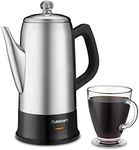Buying Guide for the Best Percolator Coffee Makers
Choosing the right percolator coffee maker can significantly enhance your coffee brewing experience. Percolators are known for their ability to brew strong, flavorful coffee by continuously cycling boiling water through the coffee grounds. When selecting a percolator, it's important to consider several key specifications to ensure you get the best fit for your needs. Understanding these specs will help you make an informed decision and enjoy your coffee just the way you like it.CapacityCapacity refers to the amount of coffee a percolator can brew at one time, usually measured in cups. This is important because it determines how much coffee you can make in one go. Percolators typically range from small 4-cup models to large 12-cup models. If you usually brew coffee for just yourself or one other person, a smaller capacity percolator might be sufficient. However, if you often entertain guests or have a large family, a larger capacity model would be more suitable.
MaterialPercolators are commonly made from stainless steel, aluminum, or glass. The material affects durability, heat retention, and the overall taste of the coffee. Stainless steel is durable, retains heat well, and doesn't affect the coffee's flavor, making it a popular choice. Aluminum is lightweight and heats up quickly but may alter the taste of the coffee over time. Glass percolators allow you to see the brewing process, which can be visually appealing, but they are more fragile. Choose a material based on your preference for durability, heat retention, and taste.
Electric vs. StovetopPercolators come in two main types: electric and stovetop. Electric percolators are convenient and easy to use, as they automatically regulate the brewing process and keep the coffee warm. They are ideal for those who prefer a hands-off approach. Stovetop percolators require manual monitoring and are typically more portable, making them suitable for camping or travel. Consider your lifestyle and where you plan to use the percolator when deciding between electric and stovetop models.
Brew SpeedBrew speed refers to how quickly the percolator can brew a pot of coffee. This is important if you need your coffee ready quickly, such as during busy mornings. Electric percolators generally brew faster than stovetop models. If you value speed and convenience, look for an electric percolator with a fast brew time. However, if you enjoy the process of brewing coffee and don't mind waiting a bit longer, a stovetop percolator might be a better fit.
Ease of CleaningEase of cleaning is an important factor to consider, as it affects the maintenance and longevity of the percolator. Some percolators have dishwasher-safe parts, making them easy to clean. Others may require hand washing, which can be more time-consuming. Look for a percolator with removable parts and a simple design to make cleaning easier. If you prefer minimal maintenance, choose a model that is easy to disassemble and clean.
Filter TypePercolators can use either permanent or disposable filters. Permanent filters are usually made of metal and can be reused, which is more environmentally friendly and cost-effective in the long run. Disposable filters, on the other hand, are convenient and can make cleaning easier, as you can simply throw them away after use. Consider whether you prefer the convenience of disposable filters or the sustainability of permanent filters when making your choice.

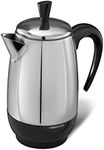
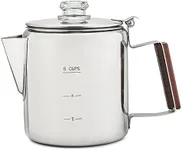
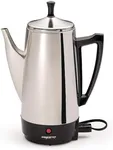
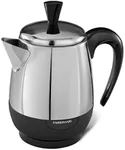
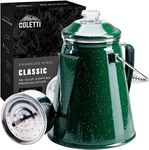

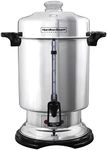
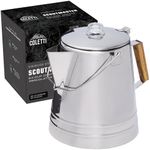

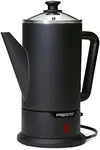
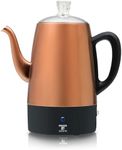
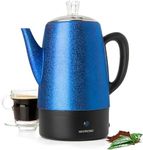
![COLETTI Bozeman Electric Percolator — Percolator Coffee Pot, Coffee Percolator – [9 cup, Stainless Steel]](https://images-proxy.bestreviews.guide/0HnvIv8SUr7PmDBfVU8LJT7DfEE=/0x150/https://m.media-amazon.com/images/I/41e-bcybHQL._AC_CX679_.jpg)
![COLETTI Bozeman Green Percolator Coffee Pot — Camping Coffee Makers — Camping’s Favorite Percolator – NO Aluminum or Plastic [9 cup, Camp Green]](https://images-proxy.bestreviews.guide/MGzjc346kKxokapUVZhSjYFRlD0=/0x150/https://m.media-amazon.com/images/I/31JgMiwqt7L._AC_CX679_.jpg)
